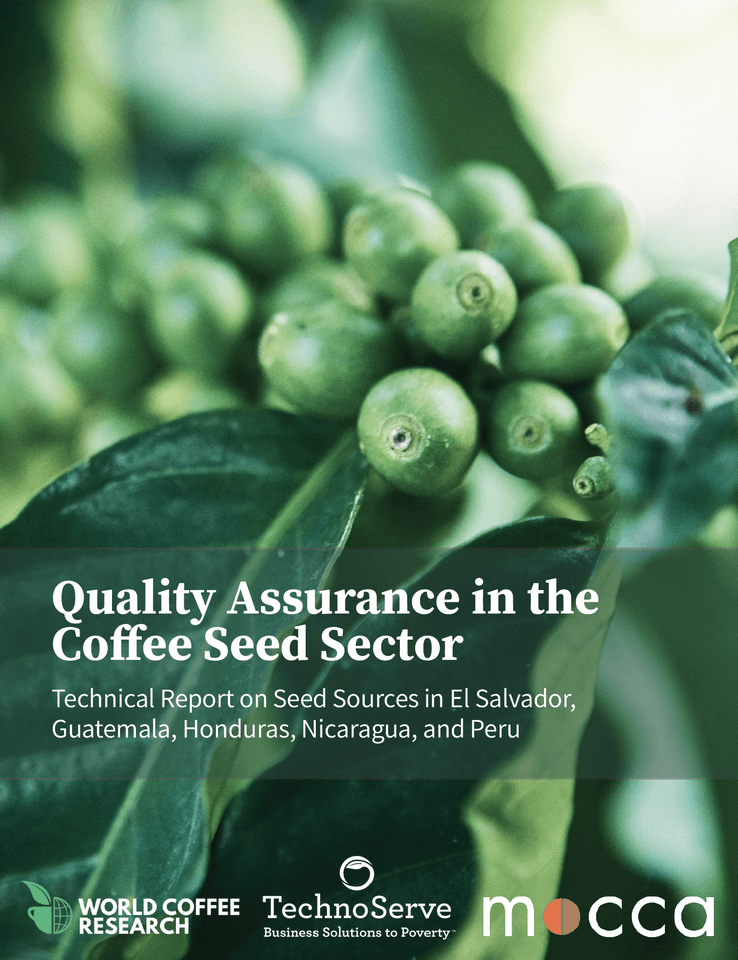
Quality Assurance in the Coffee Seed Sector
Background
Through the Maximizing Opportunities in Coffee and Cacao in the Americas (MOCCA) program, WCR undertook activities to strengthen the seed sector for Arabica coffee across 5 countries in Latin America, including El Salvador, Guatemala, Honduras, Nicaragua, and Peru.
This report highlights the findings from WCR activities to evaluate the practices and materials of local seed lots and plantations, identify promising seed sources, and improve nursery operations in these countries.
Key takeaways
- Over 36% of participating seed lots had very high rates of genetic noncompliance, with 50% or fewer tested trees showing genetic conformity. Trees grown from these materials will not have the performance and characteristics sought by growers.
- Only 26% of seed lots had high rates of genetic conformity of 90% or higher. Three coffee varieties showed higher levels of compliance (i.e., Anacafe 14, Parainema, and Marsellesa) and seed lots that focused on producing them tended to have more true-to-type materials.
- Even when genetic conformity was present, seed plantations still didn’t always follow good agricultural practices for seed production, such as isolation to avoid cross-pollination, traceability protocols, and adequate storage, putting their seeds at risk of contamination.
- There exist structural challenges like the lack of official certification tools, low profitability as many producers are not willing to pay more for quality, and limited access to technical assistance for seed production all hold seed growers back.
This information has helped WCR identify coffee sector needs including training requirements for seed growers. It has also helped identify the current genetic quality of planting materials accessible to coffee farmers in the region.
This report includes the methodologies used to reach these findings as well as country-specific findings that can inform current and future sustainability investments made by governments, the coffee industry, and local communities to strengthen the coffee value chain in Latin America to benefit local small-scale growers as well as coffee businesses and consumers around the world.
Scope
This report and the scope of its analysis were defined by the MOCCA program funded by the United States Department of Agriculture (USDA) and implemented by a consortium led by TechnoServe, in alignment with the agreed-to activity description between World Coffee Research (WCR) and TechnoServe. Data included in this report regarding the DNA analysis of materials in El Salvador comes from a 2022 study in collaboration with the Inter-American Development Bank and the El Salvadoran Ministry of Agriculture. WCR drafted this report, which covers the activities undertaken with the seed sector in five focus countries: Guatemala, Honduras, Nicaragua, El Salvador, and Peru.
The scope of this analysis also includes but is not limited to information from available bibliographies, interviews, and surveys with several market system actors such as national coffee institutes, Ministries of Agriculture, seed regulation offices, cooperatives of growers, private farmers, local researchers, and universities.
Recommended citation
World Coffee Research (2024). Quality Assurance in the Coffee Seed Sector. Technical Report on El Salvador, Guatemala, Honduras, Nicaragua, and Peru. https://worldcoffeeresearch.org/resources/quality-assurance-report
Acknowledgments
Thank you to the national coffee institutes, Ministries of Agriculture, seed regulation offices, cooperatives, private farmers, local researchers, and universities who provided information and participated in the interviews and surveys necessary for the foundation of this report, and to member company Lavazza Professional for their sponsorship and support of the MOCCA Program.